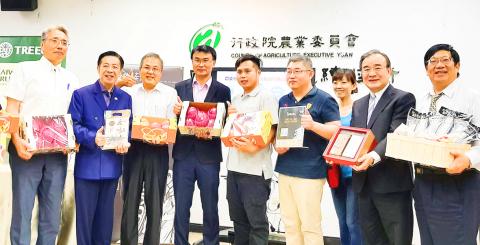Taiwan’s agricultural exports from January to last month reached a new high of NT$85.3 billion (US$2.7 billion), with sales of fruit surpassing last year’s total, Council of Agriculture (COA) Minister Chen Chi-chung (陳吉仲) said yesterday, adding that the council is eyeing new markets in Russia and the Middle East.
After last year’s agricultural exports hit a 20-year high, earning NT$164.6 billion, they made further gains in the first half of this year, Chen told a news conference in Taipei.
This year’s revenue to date came from exports of 1.16 million tonnes of produce, up 6.5 percent from the same period last year, he said, adding that rice, fresh fruit, tea, flowers and farmed fishery products were key items as exports rose 11.3 percent in the same period.

Photo: Chien Hui-ju, Taipei Times
Exports of fruit generated revenue of NT$4.23 billion from January to last month, surpassing revenue of NT$4.02 billion for all of last year, council data showed.
Wax apple sales increased 88 percent from the first half last year, while ponkans (79.5 percent), bananas (70.9 percent), and pineapples and guava (both 66.4 percent) also had significant gains, the data showed.
When export prices for fruit rise, domestic prices usually follow suit, which benefits growers, Chen said.
Exports of perch and tilapia in the first half rose 59 percent and 20.7 percent respectively, council data showed.
The US-China trade dispute has had a positive effect on Taiwan’s agricultural sector, he said.
China used to be the biggest exporter of tilapia to the US, but it has been affected by heavier tariffs imposed by the US, opening the door for Taiwan to benefit, he said, adding that the nation has also been able to import US soybeans more cheaply to make animal fodder.
Instead of relying on established markets in China, Japan and the US, the council plans to expand in the Middle East, Russia and Singapore, as well as countries targeted by the New Southbound Policy, he said.
Next month, it would hold a promotional event in Russia and in September it will set up a booth to promote Taiwanese produce at the HAO Mart in Singapore, the council said, adding that it is also mulling similar events in Saudi Arabia or Dubai in the fourth quarter.
It takes more than one week to ship products from Taiwan to Russia and double that to Middle Eastern countries, so cooling on ships is important to keep products fresh, COA Agriculture and Food Agency Director-General Hu Jong-i (胡忠一) said.

Chinese spouse and influencer Guan Guan’s (關關) residency permit has been revoked for repeatedly posting pro-China videos that threaten national security, the National Immigration Agency confirmed today. Guan Guan has said many controversial statements in her videos posted to Douyin (抖音), including “the red flag will soon be painted all over Taiwan” and “Taiwan is an inseparable part of China,” and expressing hope for expedited reunification. The agency last year received multiple reports alleging that Guan Guan had advocated for armed reunification. After verifying the reports, the agency last month issued a notice requiring her to appear and explain her actions. Guan

GIVE AND TAKE: Blood demand continues to rise each year, while fewer young donors are available due to the nation’s falling birthrate, a doctor said Blood donors can redeem points earned from donations to obtain limited edition Formosan black bear travel mugs, the Kaohsiung Blood Center said yesterday, as it announced a goal of stocking 20,000 units of blood prior to the Lunar New Year. The last month of the lunar year is National Blood Donation Month, when local centers seek to stockpile blood for use during the Lunar New Year holiday. The blood demand in southern Taiwan — including Tainan and Kaohsiung, as well as Chiayi, Pingtung, Penghu and Taitung counties — is about 2,000 units per day, the center said. The donation campaign aims to boost

The Kaohsiung Tourism Bureau audited six hotels in an effort to prevent price gouging ahead of Korean band BTS’ concert tour in the city scheduled for Nov. 19, 21 and 22 this year. The bureau on Friday said that the audits — conducted in response to allegations of unfair pricing posted on social media — found no wrongdoing. These establishments included the local branches of Chateau de Chine, Hotel Nikko, My Humble House, and Grand Hai Lai, it said, adding that the Consumer Protection Commission would have penalized price gougers had the accusations been substantiated. The bureau said the Tourism Development Act

The Central Weather Administration (CWA) said a magnitude 4.9 earthquake that struck off the coast of eastern Taiwan yesterday was an independent event and part of a stress-adjustment process. The earthquake occurred at 4:47pm, with its epicenter at sea about 45.4km south of Yilan County Hall at a depth of 5.9km, the CWA said. The quake's intensity, which gauges the actual effects of a temblor, was highest in several townships in Yilan and neighboring Hualien County, where it measured 4 on Taiwan's seven-tier intensity scale, the CWA said. Lin Po-yu (林柏佑), a division chief at the CWA's Seismological Center, told a news conference